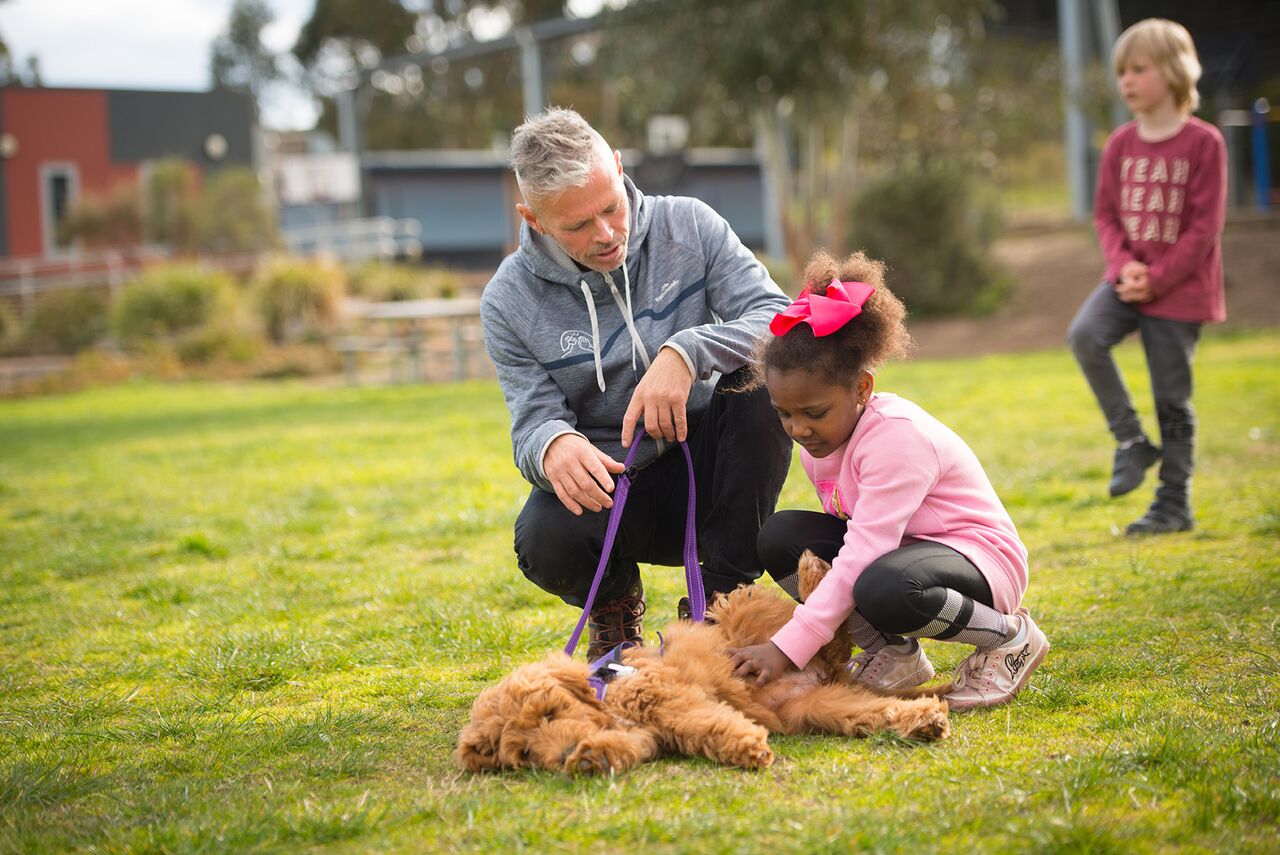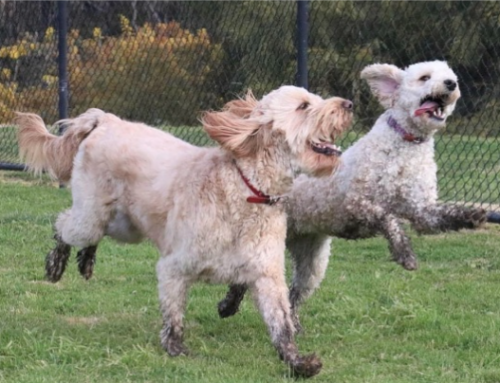It’s no secret that humans and dogs can make wonderful, supportive and meaningful connections with each other. It’s one of the reasons that dogs are now working in many settings to provide physical and emotional support to more humans than ever before. We are seeing the rise in important roles for dogs in schools, hospitals and other important settings such as Wellbeing Dogs and Therapy Dogs.
We’re all likely to be familiar with assistance dogs, like traditional Guide Dogs, who provide important support to those who suffer from low vision and blindness and other service dogs who help their owners with things like anticipating Epileptic fits, for example. However, perhaps some of us aren’t as clear on the difference between Wellbeing Dogs and Therapy Dogs.
At Dogs Connect we facilitate a world-first mental health and wellness program which supports communities to integrate a Wellbeing Dog into your community, in order to improve social and emotional balance. We have built programs that specialise in introducing Wellbeing Dogs rather than Therapy Dogs. Though Wellbeing Dogs vs Therapy Dogs offer a lot of the same core benefits and opportunities for positive impact, there are some key differences. We realise it’s easy to confuse the two different roles these dogs can play, so here we’ll go into a little more detail to help clear up any confusion:
Any Dog Can Be a Wellbeing Dog
At Dogs Connect, we work with a broad range of dogs, from puppy through to adult, to provide the appropriate training and support to the community to develop and integrate your Wellbeing Dog. The dog you choose to be the Wellbeing Dog for your community may already belong to someone within your community or perhaps your community decides to purchase a puppy or adopt a dog specifically for the role. Dogs Connect can also help you to source suitable breeds through reputable breeders if that is something you would like us to help you with.
We love to recommend breeds that have Poodle in them since they generally shed very little, if at all, making them allergy-friendly in many cases. Breeds with Poodle in them are also generally very intelligent and when crossed with a retriever or similar they are generally very happy to connect with many people and places within a community. quite placid and often quite soft and cuddly. There are many other breeds that also make wonderful Wellbeing Dogs. We would usually recommend medium to standard sized dogs over smaller dogs as they often have a calmer, more settled, temperament and are less likely to exhibit intense vocalising and body language.
Our Wellbeing Dogs are trained ‘on the job’ so it allows staff, caregivers, community members and students to learn and grow alongside your dog and every program we build is in line with the International Standards for Animal-Assisted Intervention. We work with your community to design a long term, sustainable program so that your specific needs are supported. We don’t accredit people or dogs according to testing or certain criteria and there is no pass or fail. Wellbeing Dogs always remain dogs in every sense of the word and we love to learn more about them by observing them, learning to understand them, and interacting with them in a range of ways…
Therapy Dogs, in contrast to Wellbeing Dogs, are usually very specific breeds, trained from early on as puppies to ensure they can meet the requirements of the role they are bred and trained to do. Therapy dogs usually work closely with a therapist or support an individual as part of a therapy plan, Therapy dogs usually go through an accreditation process to ensure they can provide the important support they are trained to give. Guide Dogs Australia say that the breeds they train as Therapy and Assistance Dogs are Labrador Retrievers or Labrador/Golden Retrievers. These are beautiful dogs with wonderful temperaments, but often shed a lot which can be challenging in community environments or sensitive settings such as hospitals and aged care facilities in terms of managing fur and the allergies of individuals in the community.
A Wellbeing Dog’s Role is Broad
At Dogs Connect, we introduce Wellbeing Dogs into settings such as schools, hospitals, aged care and justice communities. We have crafted our program to ensure that you learn how to integrate your wellbeing dog into your community. We also provide you with ongoing support in a variety of ways. Your Wellbeing Dog will get to know your community and will enable positive benefits, such as improved mental health and reduced stress, to as many people as possible. Just some of the other things that Wellbeing Dogs can helps with are;
- Trauma
- Anxiety
- Communication
- Awareness
- Leadership
- Behaviour
- Emotional regulation
- The escalation cycle
- Resilience
- Sensory processing
- Stress management
- Emotional literacy
In addition to the above, there are certain benefits Wellbeing Dogs can provide in different settings. Wellbeing Dogs in schools can help with attendance, behaviour, social connection and emotional regulation. In special needs communities, introducing a Wellbeing Dog may help to build responsibility and social interaction. In Justice Centres, we have found that Wellbeing Dogs have a positive influence on staff and offender mental health by providing an opportunity for nurturing and connection. In aged care, Wellbeing Dogs can help residents feel less agitated and more at home. In hospitals, Wellbeing Dogs can offer caregivers moments of uplift, lightness, and connection. Wellbeing Dogs can help emergency service workers deal with the trauma they face on the job.
Though there are crossovers in many areas of benefit, Wellbeing Dogs play a slightly different role to Therapy Dogs. Therapy Dogs often work in very specific capacities compared to Wellbeing Dogs. Though you may also find Therapy Dogs in schools, a Therapy Dog will often have a more official role to provide support for specific people who are in need of additional support or in particular therapeutic settings such as working with psychologists, speech therapists, occupational therapists, and a range of other supportive professional roles.
Wellbeing Dogs and Therapy Dogs both have very important roles to play and we always love to see and hear about dogs supporting people in any case. If you are interested in learning more about the difference between Therapy Dogs and Wellbeing Dogs, please reach out to us and we would be happy to have a deeper discussion with you.




